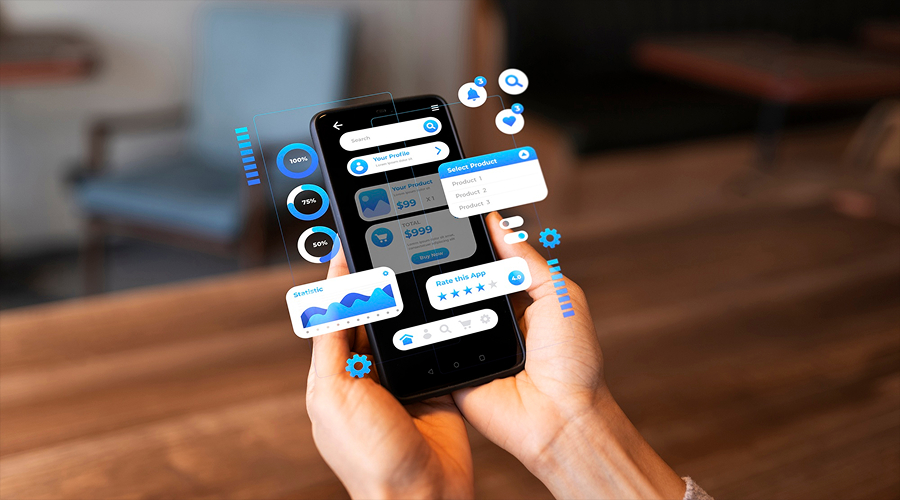
Selecting the right mobile app development partnership can be the difference between digital success and disappointment. This guide will cover the advantages of a mobile app and how to find the right mobile app development partner to reach your business goals.
Having a mobile app for your business is crucial to compete in today’s digital world and achieve the desired goals. Whether you’re a business that is just starting or an already established brand, a good app can make a bridge between you and your customers and aid in growing your business, too. But mobile app development is more than writing code. It has to be a good strategy; it requires creativity, skill, and most importantly, the right development partner. There are numerous mobile app development firms out there, and choosing the right firm that suits your business requirements can be challenging.
With the right partner, you will not only get a great product but also somebody who will listen to your objectives, communicate effectively, and be with you throughout the process of realizing your vision. This blog highlights the main advantages of mobile apps for a business and the ways to select the right mobile app development company to realize your idea.
Benefits of Mobile App Development Partnership for Business

- Better Customer Engagement: Mobile applications are direct, personal, and a good channel for reaching your customers. Push notifications, chat support, and feedback forms are the features that help keep users engaged.
- Increased Brand Awareness: Your brand is on the screen of the phone of your customer, and you get a 24-hour visibility and presence in the daily life of your customer.
- More Sales and Revenue: Shopping via mobile applications is convenient, introduces an opportunity for secure payments, and presents special offers that could bring more conversions and increase revenue.
- Enhanced Customer Loyalty: Special deals, constant value, and a reward system by using an app will convince the clients to be repeat customers and remain loyal to a brand.
- Real-Time Data Gathering: Apps will help you in collecting real-time user behavior patterns, preferences in the past, and even what they have already bought, so this can help you to provide a personalized service to them and highly personalize your marketing strategies.
How to Choose a Mobile App Development Partner?

1. Define Your Business Goals First
Begin by figuring out the main functionality you want in your app. Do you want to enhance customer service, lead generation, online shopping, or provide a user interaction platform? The establishment of such concrete objectives will help the functionality, platform selection, and user experience. For example, an e-commerce application could get high priority for checking out and product filters, whereas a service-based app could get booking features and live chat. These objectives also assist your development partner in proposing an optimal tech stack and app structure.
2. Check Their Portfolio and Case Studies
A great portfolio demonstrates the capability of a company. Look at the various kinds of apps they have created and their design. It is preferable when they have worked in different industries. Case studies are even more helpful; they describe the objectives, difficulties, and outcomes of former projects. For example, when a case study shows more downloaded apps or a great user interaction, it implies that the firm can develop functional apps.
3. Evaluate Their Technical Expertise
Inquire about the platforms they specialize in, native (Kotlin/Swift) or cross-platform (React Native, Flutter). Ask about backend services, API integrations, database management, and cloud deployment. There should also be a balance in a mobile app development company to be capable of doing the frontend design as well as the backend server setup. Their security and scalability approach also deserves mentioning in case you want to expand the app in the future.
4. Look for Industry Experience
Each industry has a specific user behaviour, compliance requirements, and UI/UX preferences. As an example, a fintech application requires safe logins and tracking transactions, whereas a food delivery application prioritizes speed and order tracking. A development firm that has experience in the domain will already be aware of these requirements, and you will not need to explain the basics, which means that there is a likelihood of an improved end product.
5. Assess Communication and Transparency
Trustful communication predetermines the whole partnership. What you need to know is how regular their updates are and in which way they deliver them: email, Slack, project management tools such as Jira or Trello? Do you receive a point of contact? Openness in terms of progress, delays, or changes to the budget is important to prevent any misunderstanding. Ensure that they are okay with close monitoring and examination of milestones with you.
6. Check Client Reviews and Testimonials
Do not just believe what the company will say to you – read what the former clients have stated. Don’t stop at testimonials on their site; look at third-party sites such as Clutch, Upwork, and Google Reviews. Are there any common themes? Are they commended for being innovative, delivering on time, and being professional? Proceed with caution in case of red flags, such as having missed deadlines, lacking communication, and quality problems. You can also request references and call former clients.
7. Understand Their Development Process
When the development process is clear and transparent, it will be easier to collaborate. Scrutinize what the mobile app development company does when revisions or new feature requests are placed during the middle of the development process. Make sure that their process includes the significant stages of the workflow, i.e., a set of requirements, wireframe, UI/UX design, development, testing, deployment, and post-launch support. The application of tools, e.g., GitHub, Figma, or Asana, can be an indication of an advanced and organized team.
8. Post-Launch Support and Maintenance
The work of app development does not stop with launching. Bugs, crashes, OS updates, and user feedback will have to be constantly addressed. Make sure your partner provides long-term maintenance contracts, periodic upgrading, and performance monitoring. In addition, inquire about the charges for minor modifications or updates. A reliable mobile app development company will take the initiative to present support packages as per your requirements.
9. Discuss Budget and Timelines Upfront
Always ask to provide an estimate in phases, such as planning, design, development, testing, and deployment. Know what is included and what is not, such as third-party APIs, premium designs, or cloud hosting.. Also, negotiate a schedule of well-defined deliverables and deadlines. Always leave some space where flexibility is concerned because certain revisions are usually necessary. Shun away from blanket cost estimations and instead select teams that offer a firm-fixed-scope or time-and-materials contract, whichever you prefer.
10. Start Small with a Pilot Project
Going all the way is never easy. You hardly know whether you will need it, so begin with something smaller, such as wireframing, UI design, or a prototype. This will enable you to test them on their responsiveness, creativity, and problem-solving ability without running a gross risk. A successful mini-project earns you trust and provides you with a good picture of the functioning of the team. It would be preferable to find out the misalignments at an early stage rather than investing in full-scale development.
Conclusion
Selecting a proper mobile app development company is a very important decision in the digital transformation of your business. It is not good to choose a partner who would simply develop your app, but find someone who would understand your goals, embrace your idea, and eventually make you successful. Do research, question, and use your instinct. With the help of a decent partner, your mobile application could become a successful tool for development, communication, and retention.






